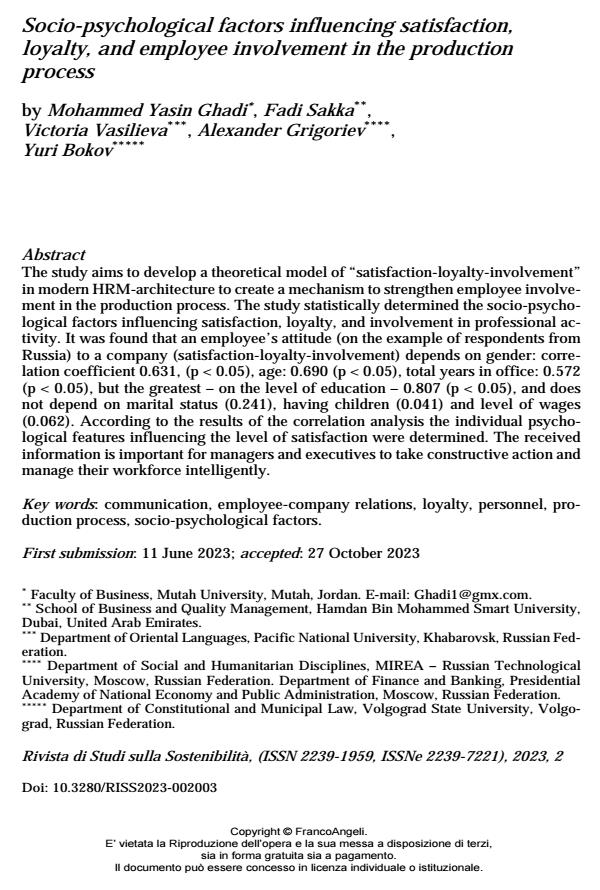Socio-psychological factors influencing satisfaction, loyalty, and employee involvement in the production process
Titolo Rivista RIVISTA DI STUDI SULLA SOSTENIBILITA'
Autori/Curatori Mohammed Yasin Ghadi, Fadi Sakka, Victoria Vasilieva, Alexander Grigoriev, Yuri Bokov
Anno di pubblicazione 2024 Fascicolo 2023/2
Lingua Inglese Numero pagine 18 P. 29-46 Dimensione file 154 KB
DOI 10.3280/RISS2023-002003
Il DOI è il codice a barre della proprietà intellettuale: per saperne di più
clicca qui
Qui sotto puoi vedere in anteprima la prima pagina di questo articolo.
Se questo articolo ti interessa, lo puoi acquistare (e scaricare in formato pdf) seguendo le facili indicazioni per acquistare il download credit. Acquista Download Credits per scaricare questo Articolo in formato PDF

FrancoAngeli è membro della Publishers International Linking Association, Inc (PILA), associazione indipendente e non profit per facilitare (attraverso i servizi tecnologici implementati da CrossRef.org) l’accesso degli studiosi ai contenuti digitali nelle pubblicazioni professionali e scientifiche.
The study aims to develop a theoretical model of “satisfaction-loyalty-involvement” in modern HRM-architecture to create a mechanism to strengthen employee involvement in the production process. The study statistically determined the socio-psychological factors influencing satisfaction, loyalty, and involvement in professional activity. It was found that an employee’s attitude (on the example of respondents from Russia) to a company (satisfaction-loyalty-involvement) depends on gender: correlation coefficient 0.631, (p < 0.05), age: 0.690 (p < 0.05), total years in office: 0.572 (p < 0.05), but the greatest – on the level of education – 0.807 (p < 0.05), and does not depend on marital status (0.241), having children (0.041) and level of wages (0.062). According to the results of the correlation analysis the individual psychological features influencing the level of satisfaction were determined. The received information is important for managers and executives to take constructive action and manage their workforce intelligently.
Parole chiave:communication, employee-company relations, loyalty, personnel, production process, socio-psychological factors.
- Analysis of the need-semantic features of managers of different levels Elena A. Lebedeva, in Russian Journal of Education and Psychology /2025 pp.651
DOI: 10.12731/2658-4034-2025-16-4-782
Mohammed Yasin Ghadi, Fadi Sakka, Victoria Vasilieva, Alexander Grigoriev, Yuri Bokov, Socio-psychological factors influencing satisfaction, loyalty, and employee involvement in the production process in "RIVISTA DI STUDI SULLA SOSTENIBILITA'" 2/2023, pp 29-46, DOI: 10.3280/RISS2023-002003